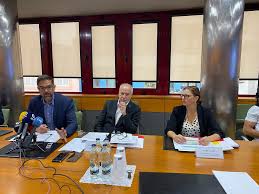
Excelcan, the Association for Research, Study and Excellence in the Tourism Sector in the Canary Islands and the Chamber of Commerce of Gran Canaria have presented the report on the tourism situation corresponding to the third quarter of 2024, highlighting the solid progress of the sector in the archipelago.
Excelcan, the Association for Research, Study and Excellence in the Tourism Sector in the Canary Islands and the Chamber of Commerce of Gran Canaria have presented the tourism report for the third quarter of 2024, highlighting the solid progress of the sector in the archipelago.
During this period, the Canary Islands received 4,169,503 tourists, an increase of 6.71 % over the previous quarter, driven by the growth of national tourism (+23.74 %) and high international demand.
The data reflect a notable increase in overnight stays, reaching 26.3 million nights (+16.66 % quarter-on-quarter), and in tourist expenditure, which reached 5,163 million euros (+23.82 % quarter-on-quarter). This growth is linked to improvements in air connectivity, higher hotel occupancy and an increase in revenue per available room.
The president of Excelcan, Santiago de Armas, and the consulting director of Corporación 5, José Miguel González, underlined that these results consolidate the Canary Islands as a competitive and accessible destination, maintaining its strength on the international tourism scene.
Challenges and Opportunities for Canary Islands Tourism for 2025
The Canary Islands are preparing to close 2024 with almost 18 million visitors and a tourist expenditure of close to 22,000 million euros, according to the projections presented in the tourism situation report.
Looking ahead to 2025, the sector faces important challenges, centred on three key pillars:
- Sustainability: Balancing tourism growth with environmental preservation and social welfare.
- Digitalisation: Incorporating technologies to improve the visitor experience and operational efficiency.
- Diversification: Expanding the tourism offer to reduce saturation and strengthen resilience in the face of climatic phenomena and market changes.
Santiago de Armas stressed the need for a balanced model that combines tourist attraction with environmental conservation, while José Miguel González emphasised the compatibility between specialisation and economic diversification in order to maintain global competitiveness.
More information AQUI